
“Look at this, Lee,” I say as I lower my head towards the screen. Lee Hendrie peers back at me. We have been talking for an hour during a gripping and sometimes distressing interview on Zoom. We have reached a painful segment as Hendrie, the former Premier League footballer who played once for England, has opened up like never before. After detailing the “five or six times” he has tried to kill himself, Hendrie has spoken about his feelings of shame.
“You see how white my hair is?” I ask Hendrie.
“Yeah,” he replies, wondering if I’ve lost my mind.
“Well, Lee, it doesn’t mean that I’m wise. It’s just tells you that I’m a very old fucker.”
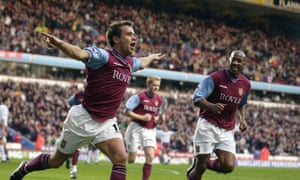
The industrial language is meant to make Hendrie laugh and it does. His laughter makes a lovely and uproarious sound. I lift my head and look straight at him. The real point, I say, is that I’ve done hundreds of interviews over the years and this one has touched me more than most. He should not feel ashamed. I feel certain that people are not going to see him as the “loser” he sometimes fears he has become. I am hopeful they will respect his courage and honesty. They will understand that, despite his vulnerability, he is trying hard to step out of the darkness that has trailed him for so long.
Hendrie is anxious as he awaits publication of this interview and his appearance on ITV’s three-part series Harry’s Heroes, which is being screened from Monday to Wednesday. He turns 43 on Monday, on the same day his wife, Emma, turns 36, but he has not been thinking much about joint birthdays. He has been consumed, instead, by worry and shame.
The usual knockabout stuff of Harry Redknapp managing a group of middle-aged former footballers, as they prepare to play Germany in a search for “redemption”, has a moving segment in the second episode. Hendrie sits down with Vinnie Jones and Paul Merson. He finds it hard but, slowly, he talks to them about two occasions when he tried to kill himself. It is a big step.
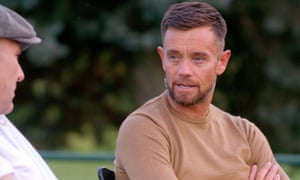
“I’ve had sleepless nights,” Hendrie says now, “thinking how it’s going to come across, how are people going to discern me, how are they going to judge me. Lots of memories will wash over me and it’s going to be difficult to watch.”
Those memories remain raw and searing. His most recent attempt was only 18 months ago and there are days when it’s hard for Hendrie to get out of bed. “I end up drinking,” he says. “But there’s nothing worse than taking alcohol and getting to the extreme levels where you don’t care at all. When that happens I’m at my most vulnerable and think it may be time to do something. The last time was a year and a half ago. The good thing is that now, when I’m low, it’s nowhere near the extremes of what I did when times were very, very dark.”
Hendrie has made considerable progress since then. Can he admit this to himself? “I can. But I don’t like to praise myself too much and you don’t know what’s around the corner. That’s my fear. Things can be fantastic one day or one week and then it can turn. I can sit in bed for three days and not want to get up.
“I’m my own worst enemy. I don’t feel I deserve any plaudits. But I’m proud I’ve become someone different. I’ve ended up getting myself into a great job working for Sky Sports. I’ve got to thank lots of people that have taken a punt on me and realised I’m not that person I’m painted out to be. For all the bad press, I’m still a human being. I’m striving to do this new job well but I always have that fear things could go wrong again.”
Before Hendrie explains his concerns as a freelance pundit in the depths of a global pandemic, he takes me back to the blackest days. In August 2010 his property portfolio, once worth £10m, had been swamped by huge debt. Hendrie knew his home and the house he had bought for his mum would both be repossessed. “The football was almost over and my head was gone. I’d been trying to sell property but the housing market crashed. I got to the stage where I just wanted to end it all. I’d hit rock bottom.”
After he tried to kill himself the first time, Hendrie says: “I vaguely remember bits of the ambulance ride. It was very blurred. But one thing that really stood out was waking up. It was horrible. I didn’t like the fact I was still alive. There were lots of worries. ‘Am I going to a psychiatric ward because I’ve done this?’ But, most of all, I was thinking: ‘I’m going to do this again. I want to be free of everything.’
“My wife went through an awful lot. She’s seen me on life-support machines. She’s seen me in distress and pain. But it’s hard to explain when you can’t reach out to someone. I was a closed book. I still am to a certain extent. But if I’d had that confidence to reach out to someone, I’m pretty sure I’d be telling you a different story.”
Nine months later, in July 2011, Hendrie tried to end his life again. “I was adamant I was going to do it. It felt like everything had been taken away. My divorce (to his first wife) was prolonged. Bankruptcy was in the wings. So this time I was going to finish it off.
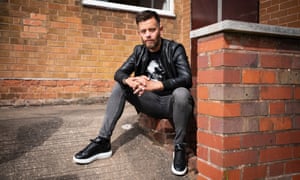
“I woke up in completely different circumstances. I didn’t realise I’d been on a life-support machine. To see my family absolutely distraught was a picture I can’t ever get out of my head. I still use that to this day when I feel very low. I can’t do that to them again. My mum says: ‘You’ve got to stop all this. You’re hurting everyone.’ I didn’t think of it like that. I just thought of it selfishly as you do when you’re in them dire straits.
“My wife took a photo of me not long after that second time. But she deleted it because she didn’t want to be reminded of how close it was to me not being around, and not bringing up my children. I’ve always been brought up as a provider. And when you’re a proud man and you can’t provide? That’s when I thought it was the end.”
Hendrie mentions only two attempts to kill himself in the ITV documentary. But were there others? He nods. “I could easily name five, six times where I tried to do that in the bad period.”
This upsetting news is deepened by the uncertainty of the coronavirus. Hendrie is still on antidepressants and his mental health is being tested again in a precarious working environment. “One thing that kept me quite close to Sky has been doing some Zoom calls with managers and players,” Hendrie says brightly. “It’s been really good and really interesting. But the situation’s very difficult. Not getting paid’s one of the big issues a lot of people are going through. I’m self-employed and not contracted so I don’t get furloughed. I’ve had a kind gesture off Sky that’s been magnificent. The last few months have been super as I’ve felt part of a team.”
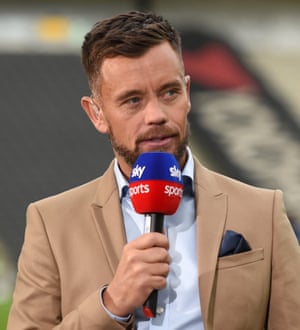
Hendrie pauses. He rubs a hand across his face. “Don’t get me wrong. I’ve had a few days where I haven’t really got up. But the kids have kept me going and kept me sane.”
Is he optimistic about getting more work as a pundit? “I am. But it’s hard to escape the lockdown. My job relies on the football industry, and it’s hanging in the balance. I’ve had a lot of sleepless nights because it could be months before I’m getting back into work. You’ve always got that doubt of people coming in and taking your job. The sport industry’s ruthless at times. But hopefully football can resume and I get back into it.”
In episode two of the ITV series, which captures Hendrie talking to Jones and Merson, we see him score a hat-trick against San Marino. He and Merson are the best players on the pitch and Hendrie tells me that, in the final game against Germany, he plays a key role. “That bit appealed to me. I got my football boots on again and it was brilliant to be amongst the lads. It’s obviously light-hearted but the competitive side comes out in the games. You’re on a high again and then, aaargh, you realise how much you miss football.”
Hendrie has only seen a few clips of the show and I reassure him that he does well off the field too. “It was very heartfelt and emotional,” he says of his conversation with Jones and Merson – a former Aston Villa team-mate.
He replaced Merson when he made his only international appearance for England, against the Czech Republic in November 1998. Glenn Hoddle, England’s manager then, said the 21-year-old had been “magnificent” on his debut.
“Glenn gave me lots of praise,” Hendrie recalls. “I should have actually scored and John Gorman (Hoddle’s assistant) said: ‘We want to bring in you, Frank Lampard, Rio Ferdinand.’ We had a fantastic under-21 side and Glenn was pushing us.”
Soon after that game Hoddle lost his job following inappropriate comments about disabled people. Hendrie never got another chance with England during his long career – the highlights of which came during his 13 years at Villa Park from 1994 to 2007. “I offered lots to Villa,” he says of a club for whom he played 252 league games. “In football now they talk a lot about assists and I’d have been in the top five (in the Premier League) then. Sometimes people forget that. They’re quick to jump on the negative things I did. But there were lots of positives.”
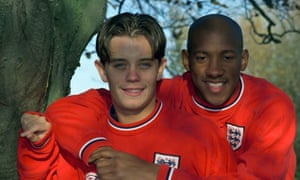
Hendrie smiles when I ask him how he plans to spend Monday – the big birthday. “It’s a treble bash because my wife’s got the same birthday as me and we’ve got Harry’s Heroes in the evening. We’ll make it a lovely day.”
His five children range in age from four to 20. Will he watch the programme with them? “Yeah. If it wasn’t for the lockdown the whole family was planning to watch it together. I would have found that a little difficult because it’s an emotional rollercoaster and I’m bringing up lots of past things. So it’ll just be me and the missus and the kids that’ll watch it here. No doubt I’ll have lots of family ringing after, and hopefully saying good things.”
Hendrie returns to his bleakest days. “It’s a sore subject and I’m not proud of the times I tried to take my life. But I want to give something back to people who are also struggling. I can still have bad weeks where I do think about doing the same. But I’m mentally strong enough to try and get over that fact now.
“I had to break the silence about what I’d gone through. I felt I had to do that for my own peace of mind so I could move forward. It makes me feel like I’m achieving something which can help someone else. The darkest times, and the most horrible, could happen to you. It could happen to my son or daughter. It could happen to anyone.”
Hendrie gazes out of my laptop screen. He looks resolute as, outside, the light fades and we disappear into another hushed evening lockdown. “Talking like this is such a positive step,” he says. “It doesn’t always work because our minds think in mysterious ways. But I can go away from this conversation and know I don’t ever want to be in that very dark place again. I don’t want to see anyone else there either. It’s not easy but I am getting better. I am getting stronger.”
Harry’s Heroes: Euro Having a Laugh is on Monday to Wednesday at 9pm on ITV
In the UK and Ireland, Samaritans can be contacted on 116 123 or email [email protected] or [email protected]. In the US, the National Suicide Prevention Lifeline is 1-800-273-8255. In Australia, the crisis support service Lifeline is 13 11 14. Other international helplines can be found at www.befrienders.org.
